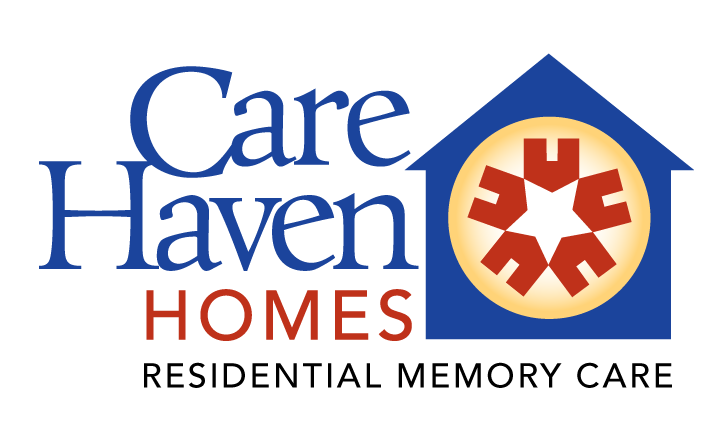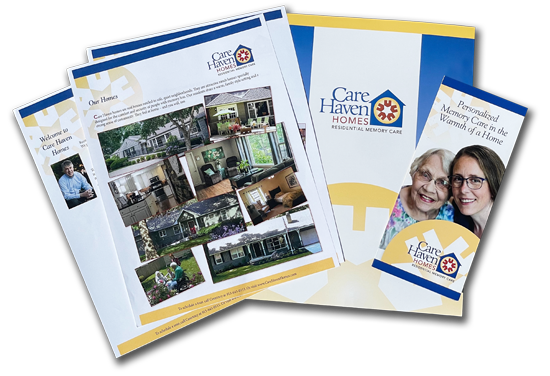While most of us know when a loved one would benefit from assisted living, recognizing that they need memory care is more challenging.
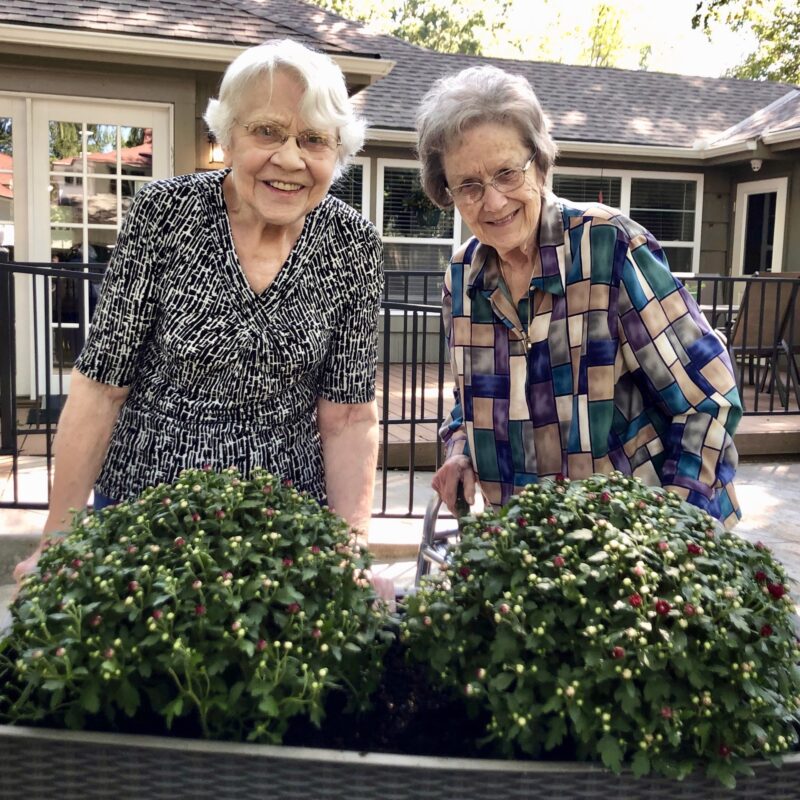
What’s the Difference?
Assisted living provides support for daily activities that become taxing as we age, such as:
- Planning, shopping for, preparing and eating healthy meals
- Keeping track of all those medications
- Maneuvering in a slippery shower or battling arthritis to button a shirt
- Finding convenient transport to the doctor or hairdresser
- Keeping up with laundry, housekeeping and household maintenance

What’s the Difference?
Assisted living provides support for daily activities that become taxing as we age, such as:
- Planning, shopping for, preparing and eating healthy meals
- Keeping track of all those medications
- Maneuvering in a slippery shower or battling arthritis to button a shirt
- Finding convenient transport to the doctor or hairdresser
- Keeping up with laundry, housekeeping and household maintenance
Memory care, on the other hand, is appropriate if your loved one also is
- Growing ever more absent-minded, forgetting to eat, pay bills or take boiling pots off the stove
- Unable to move through the day following familiar routines
- Exercising terrible judgment when faced with phone solicitations or physical hazards
- Showing up in dirty clothes, wearing mysterious bruises, too
- Increasingly aggravated, withdrawn or confused, sometimes losing their way in familiar surroundings
These are not part of the natural aging process, but instead signal cognitive changes — perhaps the onset of dementia.
When a loved one with memory issues needs a helping hand to stay safe and live well, but you can’t provide the round-the-clock support they need in your house or theirs, then you need memory care assisted living.
Scroll down to the FAQs: “How do I know when my loved one is ready for memory care assisted living?”
What is Memory Care Assisted Living?
Memory care provides the same physical support as traditional assisted living while also addressing dementia’s unique cognitive and behavioral challenges. In general, memory care features:
- More caregivers per resident, all trained in dementia care, to provide the right kind and amount of attention and guidance
- An environment, routine and activities designed to stimulate and cheer residents while also calming and comforting them
- Furnishings and features that keep life simple, safe and pleasant for someone living with dementia
- A monitored, communal kitchen that serves all daily meals, replacing unsupervised, individual cook spaces (at Care Haven, you’ll find caregivers playing “sous-chef” to talented resident bakers there, too!)
- Secure doors and yards to prevent anyone from getting lost or hurt while wandering off-site
Better Care for Better Living
The best memory care always makes residents and families feel at ease. It enhances their lives, too. For instance, in Care Haven’s memory care assisted living homes,
- Caregivers keep a watchful eye as your mother bakes her world-famous brownies. She beams while sharing them with admiring fellow residents. What’s more, you stop worrying about slips and kitchen fires — or that she’s spending long, lonely days before the TV.
- Your dad enjoys eggs and coffee every morning, followed by his daily constitutional. You don’t need to monitor his diet or check when he returns home.
- Throughout the day, your loved one engages in fun, stimulating activities. You relax during visits, no longer searching for signs of trouble.
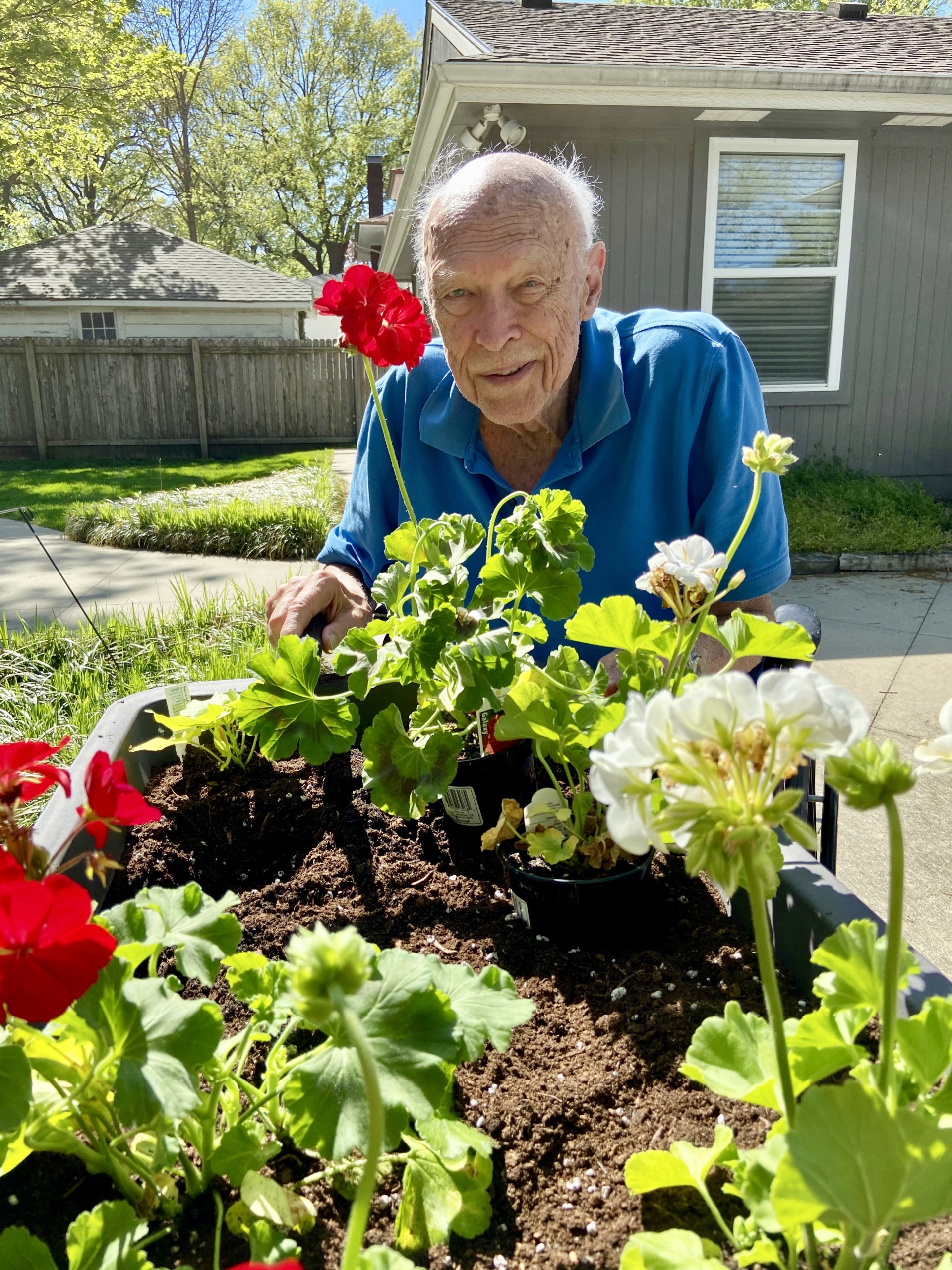
Better Memory Care in the Comfort of Home
We design our memory care assisted living homes to preserve the safety, ease and dignity of people coping with any of dementia’s stages. These are real homes, NOT Alzheimer’s nursing homes.
- We start by creating a dementia-friendly physical environment, including safety features, comfortable furnishings and soothing color schemes.
- We maintain a robust activities program – more individualized than typically found in assisted living.
- Most importantly, we staff our homes round-the-clock with highly qualified Alzheimer’s caregivers — typically one per four residents. We maintain high staffing levels to provide the support your loved one needs whenever they need it.

Better Memory Care in the Comfort of Home
We design our memory care assisted living homes to preserve the safety, ease and dignity of people coping with any of dementia’s stages. These are real homes, NOT Alzheimer’s nursing homes.
- We start by creating a dementia-friendly physical environment, including safety features, comfortable furnishings and soothing color schemes.
- We maintain a robust activities program – more individualized than typically found in assisted living.
- Most importantly, we staff our homes round-the-clock with highly qualified Alzheimer’s caregivers — typically one per four residents. We maintain high staffing levels to provide the support your loved one needs whenever they need it.
Maybe you’ve considered private care in your home or your loved one’s. That’s an option if you have the resources to remove all physical hazards, bring in any medical care or equipment you need and hire professional caregivers while you work or sleep. It’s an expensive proposition, leaving you responsible for coordinating medical and personal care, finding and supervising aides, filling in when someone doesn’t show up for a shift, finding activities to fill their days, . . . . The list goes on, leaving you little time to stop worrying and enjoy your loved one’s company.
If all that’s more than you can handle — and it is for most of us — let us take care of Mom or Dad the way you wish you could. With the kindness, dignity and respect they deserve.
What Families Say About Our Memory Care Assisted Living
In this difficult time, I am able to have such peace of heart each and every day knowing how seriously and lovingly you take care of our loved ones. Thank you for showing up each day.
– Vonnie Clarke
I was so grateful to finally have my mom in a place where she was happy. I travel a lot and it was a comfort knowing she was healthy, happy & safe.
– Linda Baker Nobles
The staff was respectful not only of my mother but also of me. I was consistently informed of any issues that arose and warmly welcomed whenever I visited.
– Maryanna Adelman
It is the most kind, caring and compassionate residential home that we could imagine! Mom was so happy here, and the staff is wonderful. Our experience certainly exceeded our expectations!
– Nancy Mayer Minsey
We’re proud to earn so many 5-star reviews from Care Haven families. See what else they say about our dementia caregiving.
Memory Care Assisted Living: Frequently Asked Questions
When is my loved one ready for memory care assisted living?
Do you see problems?
Like other experts in memory care assisted living, we believe the time to address a loved one’s dementia is when it interferes with day-to-day life — theirs and yours. So, ask yourself if you see changes that cause problems.
Start with a close look at your loved one and their home. Note anything unusual. For instance, if Mom is known for her impeccable housekeeping, then stacks of laundry, mail, newspaper or trash signal that something is amiss.
- It’s possible Mom feels tired or unwell. If so, then it’s time for a checkup.
- She could be depressed. Again, her doctor can help you address this often-overlooked condition.
- On the other hand, if Mom is in the early stages of dementia, she may have difficulty with “sequential tasks” (jobs that must be done in a particular order). These include everything from making a sandwich or paying bills to sorting, washing and folding laundry. She’s likely overwhelmed by any chore that has to be processed and performed in steps. To make it worse, Mom may feel crushed by growing piles of mail and dirty clothes or anxious at the mounting chaos. Be sure to discuss this possibility with her doctor.
The cover-up
If Mom is bright and resourceful, then she may succeed in hiding her problems (for a while). For instance, she might
- Write notes reminding herself to keep regular routines.
- Avoid — or grow uncharacteristically quiet or grouchy at — social gatherings when she can’t follow a lively group conversation.
- Refuse to go to doctor’s appointments, thereby avoiding a frightening diagnosis.
Never underestimate the role family or friends play in concealing Mom’s challenges. Devoted companions often quietly step in out of both love and a reluctance to acknowledge frightening changes.
You may notice a change in Mom’s temperament as well. If she’s increasingly anxious, agitated or argumentative, then it may be a sign that dementia (and fear of dementia) is turning her world into a confusing or frightening place.
Significant changes in familiar routines
Once you’ve addressed depression, is your loved one still struggling to maintain a daily schedule?
- People with dementia quickly lose track of time. You could find them eating breakfast in the late afternoon or wandering outside at midnight.
- Alternatively, your loved one might sleep a lot because they find it challenging to get organized and move through the day.
- Someone with Alzheimer’s also loses the sense of where they are within their physical environment. So, it’s not unusual for them to get lost on their daily walk or when returning from regular errands. Does your loved one easily find the way home?
- With dementia, finding words is as tricky as finding your way. Does Mom grow upset or unusually quiet during conversations? Perhaps she can’t get her thoughts to the tip of her tongue.
- You may notice that your loved one calls or asks questions more than usual. Or that their conversations are strange. Perhaps you find yourself repeatedly answering the same question or wondering how to respond when asked about long-dead family members — as if they’re still alive.
Things start slipping
At the medicine cabinet
It’s hard for ANYONE to keep up with the number and dosing frequency of older adults’ medications. For someone with dementia, though, it’s nearly impossible. Unfortunately, incorrect dosing aggravates medical issues, including dementia symptoms.
In the kitchen
Does it seem your loved one regularly uses and cleans the kitchen sink and counters? Are the cabinets and refrigerator stocked with healthy foods? Or, instead, do you find the crusty dishes and spoiled leftovers from your last visit? It’s essential to watch for signs that your loved one is dehydrated or losing weight.
At the table
When you share a meal, do you worry that the woman who once rivaled Emily Post has forgotten her manners? Dementia, especially Alzheimer’s, presents many challenges as people eat. For example, treating all foods as finger foods is a clue that someone struggles with the fine motor coordination silverware requires.
At the mirror
Finally, look closely at your loved one. Are they suddenly ignoring personal hygiene?
- Look for signs that they’ve given up on bathing or struggle with dressing. Do you often find them in strangely layered or mismatched outfits, inappropriate for the season? Do they wear the same clothes, unlaundered, whenever you visit?
- Perhaps you smell urine and see stains or other signs of incontinence. If so, is your loved one aware that they’re having frequent accidents?
- Have you noticed cuts, burns or bruising? Alzheimer’s, in particular, causes physical symptoms that impact strength and balance. All forms of dementia lead to miscalculation and misjudgment, whether handling a hot pan, cutting a tomato, or moving from place to place.
- Do you ever suspect your loved one hears or sees things the rest of us don’t? Pay close attention to odd stories about visiting strangers — they may be hallucinations.
(Learn more by reading our post on when senior moments are the warning signs of Alzheimer’s.)
Increasingly, you worry about their safety
First, you likely worried about driving and sold the car.
Next, you began checking in more frequently. You called weekly, then daily or even several times a day. Eventually, you started bringing in dinner every evening and offered to straighten up.
Alzheimer’s and other forms of dementia are progressive. That means symptoms march forward while your interventions become more frequent and less appreciated. In fact, your loved one may grow increasingly irritated by your rising concern for their welfare.
Eventually, the day comes when you recognize your loved one needs access to round-the-clock support or supervision. If your family can’t provide it in their or your home, then it’s time to consider memory care assisted living.
We can help. Let us partner with you to provide your loved one with the best memory care alternative.
Are memory care facilities licensed?
Memory care assisted living is state-regulated
Like other forms of long-term care in Kansas, memory care facilities must be licensed.
Each Care Haven home operates as a “Home Plus,” licensed by The Kansas Department for Aging and Disability Services. A Home Plus cares for up to 12 residents who need help managing all areas of everyday life.1
Every Care Haven caregiver is trained and certified as either a
- Certified Nurse Aide (CNA), licensed by the State of Kansas to help residents with their health and hygiene needs under the supervision of a Registered Nurse (RN) or a Licensed Practical Nurse (LPN), or
- Certified Medication Aide (CMA), licensed by the State of Kansas to perform clinical and administrative duties and to dispense medication as prescribed by a physician.
Each of our nurses is either a Licensed Practical Nurse (LPN) or Registered Nurse (RN), licensed by the State of Kansas.
Does Care Haven provide care for all types & stages of dementia?
Settle into our memory care assisted living homes
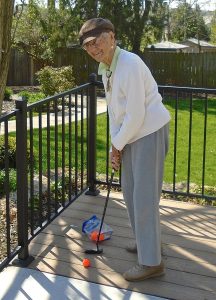 At Care Haven, our mission is to care for people with symptoms of dementia. Most have Alzheimer’s, but some live with memory loss caused by Parkinson’s, stroke or other medical conditions.
At Care Haven, our mission is to care for people with symptoms of dementia. Most have Alzheimer’s, but some live with memory loss caused by Parkinson’s, stroke or other medical conditions.
Our homes cater to different levels of cognitive and physical ability. We have houses perfect for active adults who, due to early memory issues, need just a little help. On the other hand, our Traditional Homes offer memory care services typically required in later stages. (Nearly all are covered by a flat monthly fee described under the following questions). We’re committed to making Care Haven Homes the best choice for residents and families as they travel through all of dementia’s stages.
As experts in dementia care, we recognize that this is the optimum setting for most, but not all, people living with dementia. For instance, we don’t offer intensive rehab, nor are we equipped to provide care that involves feeding tubes or IV therapy. Additionally, unchecked aggression is problematic in our family-style setting.
We depend on our nursing staff to guide the admissions process, ensuring we can meet new residents’ needs and families’ expectations. A Care Haven nurse assesses each prospective resident, thoroughly reviewing all health issues related to dementia or other medical conditions. We rely on their opinion on whether Care Haven fits you and your loved one.
What's included in Care Haven's flat monthly fee?
Premier memory care assisted living
A well-appointed home
- Private bedroom, which you may decorate with personal furnishings and accessories — many with a private bath, too
- Thoughtfully designed common spaces, including living room, dining room, kitchen, patio or deck, landscaped grounds & fenced backyard with walking paths
- Three nutritious, home-cooked meals daily, together with snacks (available any time of day)
- Maintenance-free living, including housekeeping & laundry services
- Free cable & Wi-Fi
- Dynamic, highly individualized activity program
- For your loved one’s safety: medical alert systems, secure yards, exit doors that restrict elopement, emergency generators & custom fire alarm systems
Premier care
- Health & diet management, which in our Traditional Homes includes extra help at mealtime without additional charge
- Nursing staff to oversee residents’ health care, including at least six daily nurse visits per resident each week
- 24-hour emergency response by an on-call nurse, seven days per week
- Coordination of home health & hospice services
- Trained & licensed care staff on duty round-the-clock, not just during the day
- Staffing levels that are among the highest in senior living — typically 1 caregiver per 4 residents — for more responsive care
- Help with “activities of daily living,” including bathing, grooming, dressing & encouragement to join in the life of the house
- Medication management without additional charge, no matter the number or frequency of medications prescribed
- Continence management without additional charge for toileting (If we provide incontinence supplies, we add their cost to your monthly fee, but we do not charge for gloves)
- In our Traditional Homes, transfer assistance without additional charge, even when a resident needs the help of either two aides or a mechanical lift
Does Care Haven offer optional services?
Complete care
 Driving your mom to the doctor, lab or beauty shop is time-consuming — even dangerous if it’s icy and she’s frail. Odds are, she finds these trips stressful, too.
Driving your mom to the doctor, lab or beauty shop is time-consuming — even dangerous if it’s icy and she’s frail. Odds are, she finds these trips stressful, too.
We offer optional medical and personal services to make life more convenient for you while keeping your loved one safe and comfortable. They include the following:
- Primary care
- Podiatry
- Dental care
- Lab services
- Pharmacy and medication management
- Transport
- Salon care
- Adult continence product supply
The cost of these optional services is billed to the resident or their insurance company, as more fully described on our medical and personal care page.
How do Care Haven's fees compare?
Memory care assisted living costs: base fees & add-ons
Our Care Haven homes house small communities of people with similar needs. We staff each with enough caregivers to provide any help the residents in that home need. Maintaining a sizeable professional care team is our most significant expense — which we cover with your flat monthly fee. So, if your dad lives in one of our Traditional Homes, we won’t charge extra if he needs two people to help him out of bed. And we certainly don’t bill you for the time we spend making sure Mom looks her best each morning, no matter which of our houses she calls home.
That’s unusual. In most memory care assisted living facilities, you pay a base rate for room and meals and extra fees for any assistance your loved one requires. You’re charged more for help with support stockings, showering or bandaging a skin tear. The more aid your loved one needs, the higher your monthly bill.
Some facilities charge a la carte fees for each service performed, which can lead to monthly surprises. To level out monthly billing, other facilities assign residents to service tiers — your loved one moves up a tier whenever they need more help, and you start paying a higher flat monthly charge.
Are you paying for quality?
Just because you pay for more services doesn’t mean your loved one is receiving enough support. When looking at different facilities, compare the total amount you’ll pay each month for the care your loved one will require, both now and several years from now. Then contrast the caliber of caregiving.
If you expect caregivers to respond quickly to your loved one’s needs, then ask about round-the-clock caregiver staffing ratios.
- Care Haven’s Traditional Homes maintain a ratio of one Kansas-certified medication aide or nursing assistant per four residents. (Be sure the ratios you compare include only licensed employees responsible for direct personal care on their shift, not nurses making rounds or unlicensed auxiliary workers.)
- Ask about staffing shortages. At Care Haven, we maintain high staffing levels in each home, day in and day out.
- While you’re at it, ask about staffing consistency. Do residents see familiar faces on most shifts?
If you’re worried about the medical attention your loved one receives, ask how often they’ll see a nurse. A Care Haven nurse visits each resident nearly every day of the week. One of our nurses remains on-call for emergency response every night and weekend. We don’t charge extra for the healthcare services they provide residents.
We believe Care Haven offers the best care and value for those who need memory care assisted living. Talk with us to discuss how flat monthly pricing takes the guesswork out of planning for your loved ones’ future needs.
Comparing base fees — what do they include?
Below are the features and services you’d expect of an assisted living (AL) and whether they’re typically included in your base charge. Find out precisely what your fees cover as well as what increases and add-ons to expect as dementia progresses.
AL = Assisted Living
CHH = Care Haven Homes
(Most of our residents live in a Traditional Home rather than our low-assist model. We’d be happy to discuss which is the best fit for your loved one.)
Service or Amenity
Is a la carte pricing better if a resident needs minimal aid?
Theoretically, if your loved one requires very little help, you might save money with a fee-for-services plan — at first. It looks like a bargain when Mom only needs a daily reminder to take her pills.
But, because Alzheimer’s and other forms of dementia are progressive, Mom eventually requires much more help. A la carte pricing can become suddenly and increasingly expensive when she does.
You eventually may need nearly all the services a memory care assisted living facility provides. When that day comes, can you afford all the a la carte fees they’ll need, or are you prepared to find a new home as your monthly bills skyrocket?
In an uncertain world, our families prefer predictable expenses for dependable long-term care.
